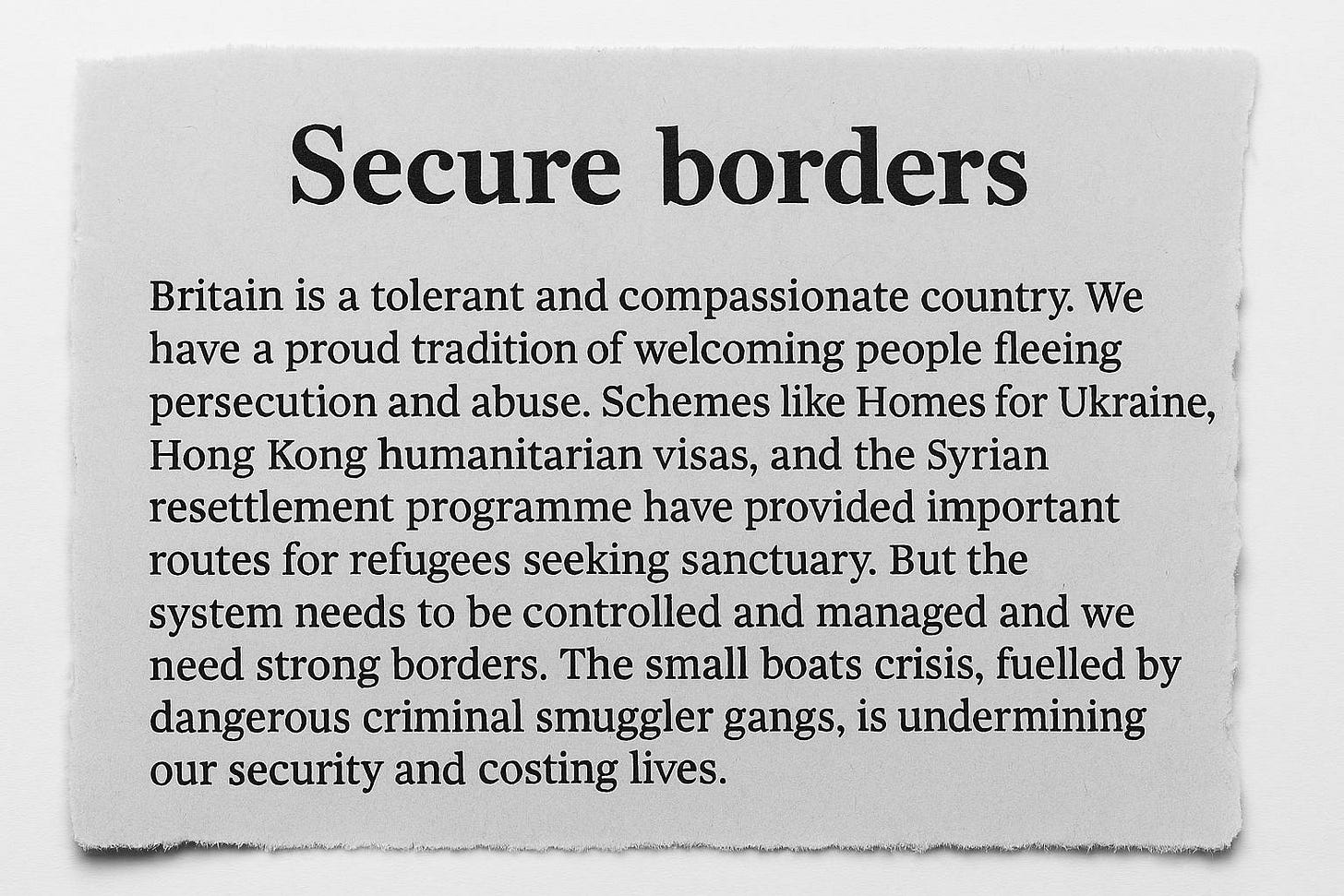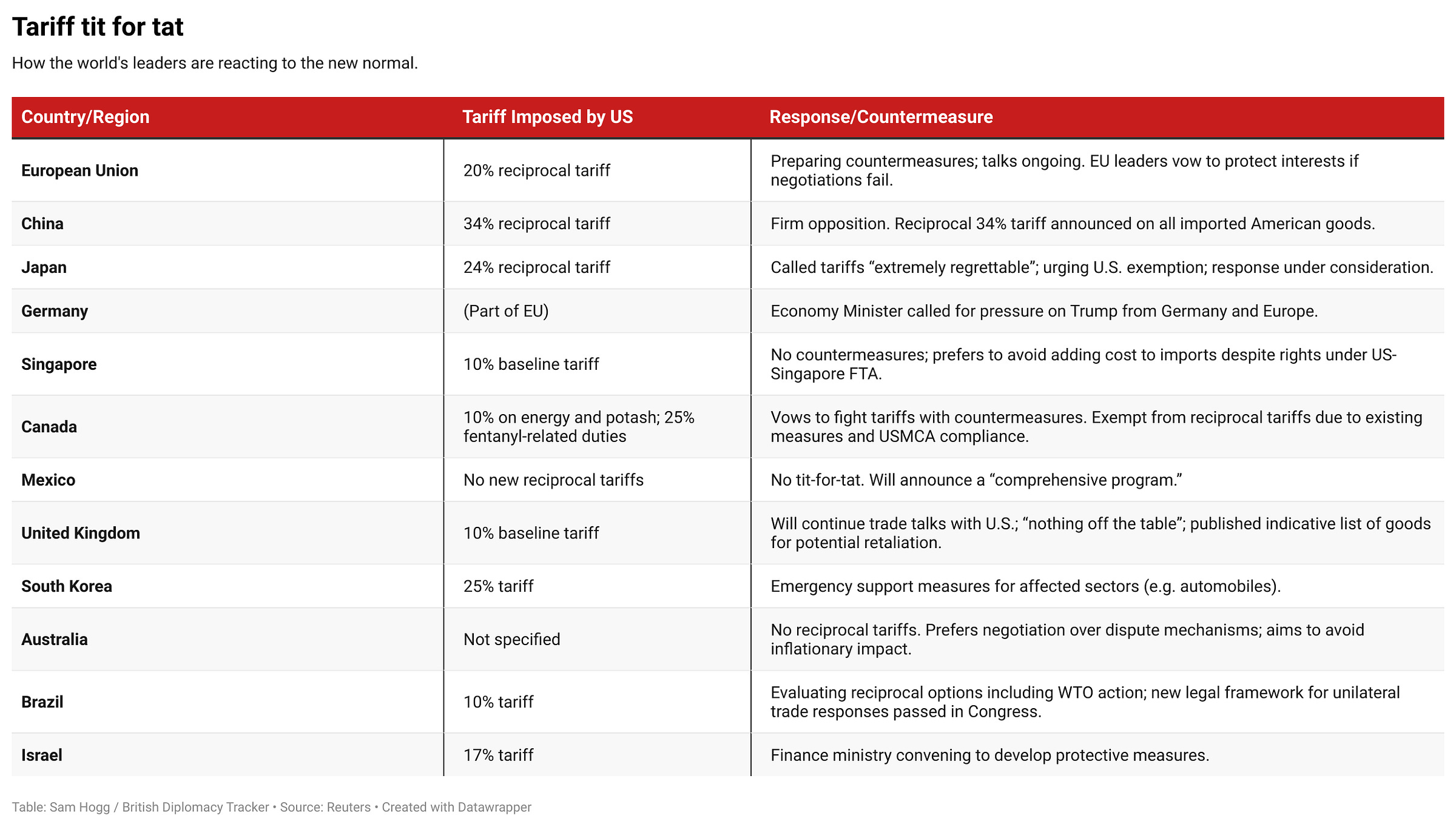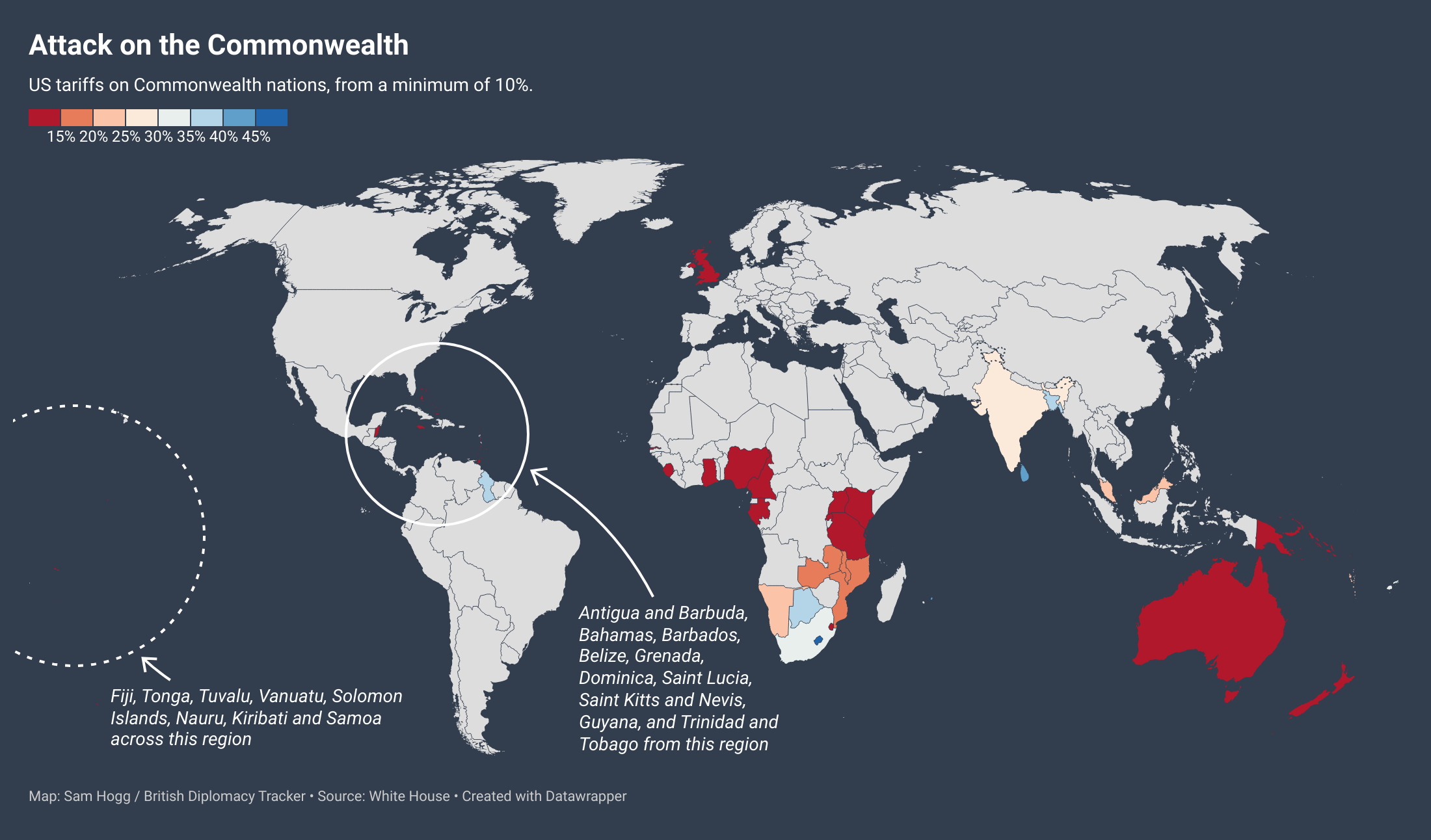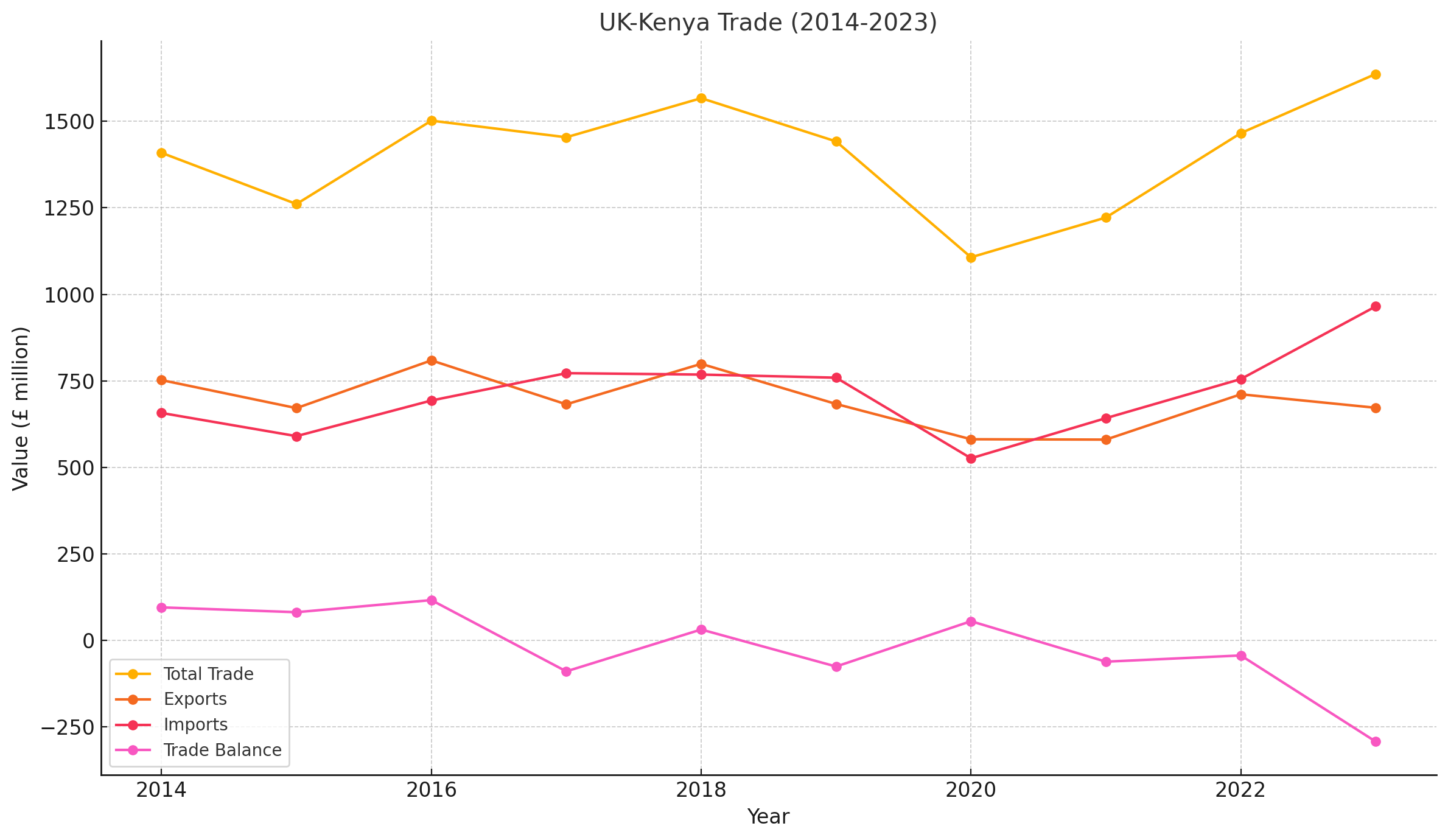Telegram 017
Tariffs, illegal immigration, Kenyan AI: Sam Hogg's British Diplomacy Tracker
As a reminder: all opinions expressed in these Telegrams are my own personal opinions, not my employers. This is a project I run in my free time looking at issues under the geopolitical radar from a Westminster perspective.
Hello,
“Last night, the President of the United States acted for his country. That is his mandate. Today, I will act in Britain’s interests, with mine.”
So spoke Prime Minister Keir Starmer at a gathering of business leaders in Downing Street on Thursday morning. The previous evening, the United States of America imposed a baseline 10% tariff on all goods entering the country, with higher tariffs on approximately 60 countries with which it has significant trade deficits or that impose substantial tariffs on U.S. goods. Mathematically, the new tariffs appeared unsound. Politically, they were consistent with much of what Mr Trump and his advisers have long discussed. Those looking to the future would do well to skim the White House’s ‘America First Investment Policy’ from February this year. Those looking for a reasoned and interesting argument as to why Mr Trump placed these tariffs should consider reading this.
In a certain way, the British Government was pleased to be in the lowest 10% bracket. The United States is Britain’s largest trading partner (excluding blocs like the EU), accounting for somewhere in the region of 17% of all trade, and both countries have what the Prime Minister has repeatedly referred to as “a fair and balanced trade relationship”, meaning minimal surplus or trade deficits. Washington and London are deep in negotiations around a potential economic agreement; talk to diplomats and those operating around the deal, and they suggest it’s fairly advanced with a focus on technology and regulation. For the moment, Mr Starmer should, and will, be praised for his deft diplomacy in making sure Britain sits in this tier.
As trade wars go, Thursday’s initial announcement had been factored in already by British leadership. Business and Trade Secretary Jonathan Reynolds told MPs “it remains our belief that the best route to economic stability for working people is a negotiated deal with the US that builds on our shared strengths.” However, he launched a “request for input on the implications for British businesses of possible retaliatory action” over the next month, with over 400 pages of potential products outlined. There was even talk among some economists, politicos and analysts of Britain positioning itself as a more favourable destination for companies seeking to access the U.S. market, compared to those in Germany (20% tariff) and Japan (24% tariff). Perhaps. But this also comes with risk: if the UK is perceived as a tariff evasion route (via transshipment or content rules), it may face Trumpian retaliation.
Nothing in the world happens in isolation, and - despite the best efforts of some - globalisation and the debts and promises made by liberal democracies to other nations must still be accounted for. Mr Trump targeted nations like Vietnam (46%), Sri Lanka (44%), Bangladesh (37%), and Madagascar (47%), many of which anchor aid-driven relationships. They also form part of a wider region in which the White House has spent decades and billions of dollars attempting to build influence. Consider how often analysts have noted Chinese operations or efforts to influence or coerce in Fiji (32%), the Solomon Islands (10%), or Taiwan (32%). Most of these are not rich countries, and many of their economies rely extensively on access to the system which Mr Trump is currently dismantling.
Then there is the British geopolitical outlook. Over 45 nations from the British Commonwealth were hit. These are not wealthy countries looking to exploit the US economy; just over 67% have over 20% of their population already living below the poverty line. Many of these nations are core nodes in UK development finance through its finance institution, British International Investment (BII), and soft-power projection targets, already facing substantial economic pressure and caught between great power struggles. The economic impact of these tariffs will likely see Britain forced to use its diplomatic budget and political capital not for poverty alleviation but to stabilise key supply chains disrupted by American protectionism.
On artificial intelligence, a technology that will define the next decade in a way few policymakers yet grasp, the tariffs also present issues. Mr Trump exempted certain key tech products under Section 3(b), Annex II of the EO, including semiconductors. But tariffs on Taiwan, Japan, South Korea, and key assembly hubs (Vietnam, Malaysia, Cambodia) could force a decoupling of semiconductor and compute-intensive AI stacks. Although semiconductors and certain critical technologies are nominally exempt, the structure of Mr Trump’s order ensures strategic ambiguity, giving the White House leverage to selectively enforce or withdraw those exemptions. This creates regulatory risk for firms, factories and leaders.
Let us briefly dwell on some potential upsides. Mr Starmer’s diplomatic push seems to have paid off, relatively speaking. Could Britain begin to position itself as a trusted, savvy, and transactional mediator between the US and other affected nations? Could it lure producers into the country? And to what extent will this economic shock trigger a resurgence in the belief of free trade and globalism over the next decade?
History has a troubling knack of skulking its way through the corridors of power, kicking in the doors of those whom it believes are ignoring its lessons. Those who dismissed warnings about the escalating logic of American protectionism are now forced to reckon with a transformed landscape, one where tariffs act as both economic barriers and geopolitical signals. These are new eras with old ideas.
— Sam Hogg
Keir Starmer, Britain’s Prime Minister, assembled nations and organisations in London to discuss tackling illegal immigration and international crime associated with it. “I’ve put smashing the gangs on the agenda of international summits. Showing that the UK now means business. Working together with our allies. We’ve struck new agreements and plans with so many of the countries represented in the room here today,” said the Prime Minister.
David Lammy, the Foreign Secretary, visited Madrid for a meeting of the Foreign Ministers of the Weimar +. The Foreign Ministers of the United Kingdom, Germany, France, Italy, Poland, Spain and the High Representative of the European Union for Foreign Affairs and Security Policy issued a long statement on Ukraine.
Mr Lammy travelled onwards to Brussels to attend a NATO gathering. He used his speech to urge other NATO partners to increase defence spending.
Jonathan Reynolds, the Business and Trade Secretary, argued a softly softly approach, rather than reciprocal tariffs, was the best strategy to pursue after Britain failed to avoid tariffs from the United States of America. No10 appeared pleased that it was in the 10% tariff band. Downing Street is still trying to carve out exemptions as part of a wider trade deal.
Donald Trump, the US President, gave a green light to the UK’s plan to hand the Chagos Archipelago to Mauritius. Britain’s Parliament has yet to see any meaningful level of detail around the deal.
Britain’s Defence Science and Technology Laboratory (Dstl) and Defence Science and Technology (DST) Group Australia announced a partnership to develop next-generation sub-systems for low-cost weapons systems, bringing together cutting-edge technologies from both nations.
Britain announced a £20 million investment to kickstart ‘Starmaker One’ – a British private fusion investment fund that will help fusion businesses and start-ups in the sector grow and commercialise at scale.
Scottish Secretary Ian Murray, Lord Mayor of London Alastair King and Scottish Financial Enterprise Chief Executive Sandy Begbie met key sectors in a series of events in New York during Tartan Week.
The Foreign Office issued a statement in response to the latest Chinese military exercises around Taiwan. “We are concerned by China’s military exercises around Taiwan, part of a pattern of activity which is increasing tensions and risking dangerous escalation in the Taiwan Strait. The UK reaffirms our clear interest in peace and stability in the Taiwan Strait, which is of critical importance to global prosperity, and our support for a free and open Indo-Pacific. We consider the Taiwan issue one to be settled peacefully by people on both sides of the Taiwan Strait through constructive dialogue, without the threat or use of force or coercion. Military drills or threats to Taiwan are not conducive to such dialogue. We do not support any unilateral attempts to change the status quo.”
Britain delivered an aid package of up to £10 million for Myanmar, following the earthquake that devastated the country.

1. ORGANISED IMMIGRATION SUMMIT
KEY POINTS:
Prime Minister Keir Starmer has vowed to crack down on illegal immigration and people smuggling, both as a domestic and international priority issue.
On Monday, he convened representatives from over 40 countries, and companies such as Meta, to discuss new approaches.
Britain has launched new partnerships and funding for tackling this issue at the root, including with countries such as Iraq and Albania.
On Monday, Prime Minister Keir Starmer assembled over 40 nations and groups in London - including China and the United States, no small diplomatic accomplishment - to tackle the problem of illegal migration at "every step" of the route.
Quoted
“The truth is - we can only smash these gangs, once and for all if we work together. Because this evil trade, it exploits the cracks between our institutions. Pits nations against one another. Profits from our inability at the political level to come together.”
Keir Starmer, Prime Minister, delivers comments at the gathering
People smuggling and illegal immigration have been a central focus of the Labour Government during its first nine months. Why? Three interlinked reasons are worth considering, each with foreign policy and economic dynamics.

It was a Labour manifesto pledge: Successive governments have failed to limit illegal immigration across the English Channel. As a point of differentiation and based on polling data, Labour committed to tackling this issue head-on if it won the General Election. Having done so, the government must be seen to be making progress if it wants to reduce the probability of voters leaking to opposition parties Reform and the Conservatives. Additionally, illegal immigration and its second and third order impacts are increasingly discussed in dimly lit and noisy pubs frequented by Westminster’s influential wonk scene. That’s starting to permeate through to Downing Street, with tougher action - failure to comply will result in fines of up to £60,000 and prison terms of up to five years - promised for companies employing illegal immigrants as part of Mr Starmer’s speech.
It has significant costs: Aside from societal impacts, which Mr Starmer alluded to in his speech - “it undermines our ability to control who comes here, and that makes people angry. It makes me angry, frankly because it is unfair on ordinary working people who pay the price” - illegal immigration is expensive.
Noted
The Government has returned more than 24,000 people who did not have the right to be in Britain since coming to office.
The non-partisan Institute for Fiscal Studies found that costs relating to asylum and illegal migration are an estimated £6.4 billion of pressures on day-to-day spending in 2024–25. A 2024 non-partisan House of Commons research report analysed various documents and costings. It found the average annual unit cost of an irregular migrant to the NHS was £570, and the average cost per day to hold an individual in immigration detention was estimated to be around £116 between October and December 2023. Further IFS analyses found the number of asylum seekers in ‘contingency, initial and other types of accommodation’ (a category that includes hotels) was 16 times higher at the end of March 2024 than at the end of March 2020.
The view from Downing Street is that this is unsustainable across several fronts: economically, societally, and - given that states rely on data to create policies, and many illegal immigrants understandably don’t announce themselves on record - from a governance point of view too. It is difficult to create strategies if you can’t get an accurate headcount.
It’s international: Downing Street views cracking down on illegal immigration as a multinational affair. As covered in previous Telegrams, joint work is underway with Iraq, Vietnam, Albania and other countries to tackle these issues at their source. Meanwhile, high level work with France and Germany has sought to change definitions and rules around halting footfall. For example, France’s maritime doctrine prevented law enforcement from responding to small boats in shallow waters; that’s changed. And with Germany, it wasn’t technically illegal to facilitate people-smuggling to a country outside the EU; that’s changed too. Following the summit, the governments of Albania, China, Sweden, Tunisia, the United Kingdom, the United States, and Vietnam signed a joint statement setting out further plans to tackle organised immigration crime.
Quoted
“There is also nothing progressive about allowing working age people to come here illegally instead of supporting them to build their own economies, secure a better future for their own countries, and build a safer, more prosperous world.”
Keir Starmer, Prime Minister
Beyond the United States, other nations are dramatically changing their own approach to illegal immigration and asylum. Italy has signed migration deals with Tunisia and Libya to limit departures, Germany announced legislative amendments including more restrictive asylum laws and an increase in deportations, and Australia continues its policy of offshore processing, detaining asylum seekers in facilities such as those on Nauru despite UN criticism, and has introduced legislation allowing for the deportation of unlawful non-citizens to third countries.
2. FIRS
KEY POINTS:
From July, individuals and organisations acting at the direction of foreign powers must register UK-based activities under the new Foreign Influence Registration Scheme. The scheme includes a general political tier and a stricter enhanced tier targeting hostile states such as Russia and Iran.
Registration covers a wide range of sectors and scenarios, including lobbying, media, research, events, consultancy, and charitable campaigning. Real-world examples include charities lobbying ministers with foreign funding, tech executives reporting to hostile governments, and journalists publishing at state direction.
Failure to comply carries criminal penalties of up to five years in prison. A new public register will provide visibility, with limited exemptions where safety or security risks apply. The scheme aligns the UK with international partners and signals a shift to greater scrutiny of covert state-linked activity.
On the eve of the 20th century, the British government faced a problem. Deeply invested in the ‘Scramble for Africa’, it boasted the world’s largest and most powerful navy and an empire on which the sun never set. Across the channel, Chancellor Otto von Bismarck had reshaped Europe, forming a newly unified German empire. Across the Atlantic, America was entering its Gilded Age. Yet Britain had a problem: for all its global reach, power and pomp, it had no meaningful law to stop state secrets from being shared. The Official Secrets Act 1889 sought to rectify that. While flawed, it set a framework patched several times in the following years.
Quoted
“In recent years we have had very conspicuous examples of the necessity of guarding official secrets, and protecting official documents. It is a duty which every citizen owes to the country, that he should not facilitate the military operations of other countries by giving copies of official documents, and this Bill is intended to remedy existing defects in our law in that respect.”
Lord Halsbury, introducing the Bill in 1889
A century and a half later, and Britain again finds itself updating its spy laws. From 1 July, the United Kingdom will bring into force the Foreign Influence Registration Scheme (FIRS), a new statutory requirement for individuals and organisations acting at the direction of foreign states, promised as part of the National Security Act 2023. The scheme includes two distinct tiers.
The political influence tier applies to all foreign powers except Ireland and captures activities intended to influence elections, government policy, legislation, or political parties.
The enhanced tier applies only to countries the UK designates as posing a risk to national security. So far, that list includes Iran and Russia. Activities directed by these states, or by organisations they control, must be registered regardless of purpose. The requirement applies whether or not payment is involved, and whether direction is formal or informal.
Noted
Despite repeated cross party calls from select MPs and campaigners, China has not been included on the enhanced tier at present.
The Government’s position is that foreign influence is not inherently illegitimate - a point frequently missed in Westminster. However, covert influence distorts public debate, undermines democratic institutions, and carries security risks. FIRS is intended to correct this by making state-linked activities visible and accountable. For the political tier, actors must register within 28 days of being directed by a foreign power to influence UK political affairs. Under the enhanced tier, actors must register any activity before it begins. Those who fail to do so may receive an “information notice” from the Home Office. Ignoring or refusing to comply is a criminal offence. Offenders can face up to two years in prison under the political tier and up to five under the enhanced.
Quoted
“It is our duty to defend the safety and interests of the UK. That is why we are commencing FIRS. That is why we are introducing greater protections for our democracy. And that is why we are clamping down on the threat from states that conduct hostile activities in and against the UK.”
Dan Jarvis, Security Minister
Sector-specific examples demonstrate the breadth of FIRS.
A charity that receives funding from a foreign government to lobby a UK minister about development aid is required to register.
So too is a civil society organisation that is directed to hold an awareness event or run a social media campaign on a foreign government’s behalf. I
n one illustrative case from the guidance, a Russian tech executive instructed by the Kremlin to attend a UK AI conference and report back to Moscow would fall within scope.
A UK charity that is offered diplomatic promotion and donations in exchange for influencing a peer in the House of Lords is also required to register.
The enhanced tier even captures academic conferences, awareness events and policy articles if directed by a hostile power.
Media organisations are not exempt. A journalist publishing articles or hosting events in the UK on instruction from a designated state must register under the enhanced tier. The exemption for recognised news publishers only applies under the political tier and does not shield those acting for hostile states.
In the defence sector, a UK contractor asked by the Iranian Ministry of Defence to attend an arms symposium and report findings would fall within scope. Businesses are also captured.
A lobbying firm instructed by a foreign power to influence MPs must register.
A state-owned company is only required to register if its UK activities are directed by the state, not merely because it is state-owned.
The UK’s approach mirrors similar measures in the United States and Australia, and is informed by rising concern over foreign interference. Ministers argue that FIRS enhances democratic resilience without obstructing legitimate engagement. Engagement remains welcome, but secrecy will no longer be tolerated. A public register will be maintained, except in cases where publishing the information could endanger individuals or national security. The Foreign Secretary and Home Secretary will have powers to review designations and exemptions. For those working in diplomacy, policy, media, research or civil society, the direction of travel is now clear. If you are acting on behalf of a foreign power in the UK, you will be expected to say so.
DEFENCE
John Healey, the Defence Secretary, held a meeting with venture capital firms on how to incentivise greater private investment into defence and deep technology.
Lord Vernon Coaker, Defence Minister, visited Poland.
British built Typhoon jets arrived in Eastern Poland to take part in a NATO enhanced air policing mission.
The Royal Navy’s submarine-hunting Merlin helicopters will receive world-class maintenance under a £165 million contract extension, supporting 1,000 skilled UK jobs.
FOREIGN AFFAIRS
Keir Starmer spoke to the President of Ukraine, Volodymyr Zelenskyy, reaffirming Britain’s support. Mr Starmer hosted President of Finland Alexander Stubb in Downing Street, discussing JEF membership among other issues.
David Lammy, the Foreign Secretary, travelled to Kosovo and Serbia to strengthen cooperation on tackling irregular migration and serious organised crime.
Britain and Vietnam signed an agreement to tackle human trafficking. It builds on a memorandum of understanding signed by the two countries in 2018.
Lord Collins, Minister for Africa, UN, Commonwealth & Human Rights, visited Uganda.
AI & EMERGING TECH
The British Government set out the scope and ambition of its promised Cyber Security and Resilience Bill.
Nick Joad, Director for Defence Science and Technology, visited Singapore for a defence summit. He discussed quantum technologies and other issues.
A Government-commissioned report argued for stronger international collaboration to enhance Britain’s critical minerals capabilities, attract talent, and secure finance in midstream critical mineral processing and recycling. It identified opportunities to partner particularly with Australia, Canada, and Western nations, enabling greener supply chains, knowledge transfer, and investment into UK-based operations.
Peter Kyle, the Science and Technology Secretary, toured an AI company ahead of plans to launch a new scheme targeted at school children.
SANCTIONS
Britain sanctioned officials in Guatemala, Georgia and Moldova on corruption charges.
SOFT POWER AND AID
Paul Robert Turner, High Commissioner to Solomon Islands and Non-Resident Commissioner to the Republic of Nauru, is the new International Commissioner of the Solomon Islands Scout Association.
Judith Cummins, the Deputy Speaker of the Commons, visited Sri Lanka.
The leaders of the French and British armies will visit Ukraine this weekend to work alongside Ukrainian military forces on deploying guarantee troops
TRADE & BUSINESS
Sarah Sackman, a Justice Minister, joined British lawtech firms in Chicago to see how the UK legal sector is putting AI at the front and centre of its services.
British Chamber of Commerce Rwanda launched.
UK Export Finance (UKEF) is providing a £184 million credit guarantee to support the construction of the 495 MW Fengmiao 1 offshore wind farm in Taiwan, securing £55 million in manufacturing and service export contracts for British suppliers.
The London Stock Exchange welcomed China’s Ministry of Finance.
DIPLOMATS
Oliver Christian has been appointed as His Majesty's Consul General to New York and HM Trade Commissioner for North America.
UK Special Envoy for the Western Balkans, Karen Pierce, met Deputy Prime Minister and Minister of Foreign Affairs of Montenegro, Ervin Ibrahimović.
High Commissioner to Pakistan, Jane Marriott, called on President Asif Ali Zardari.
Speaking to the Observer, the former UK ambassador to Washington Kim Darroch told the paper “It is clear that the United States is no longer a reliable partner.”
KENYA LAUNCHES AI STRATEGY
KEY POINTS:
Kenya hopes to become an African AI leader, and has published a new strategy
Britain’s Foreign Office helped feed into the strategy
While naming key concepts, it lacks credible pathways and timelines, but nonetheless is a positive step
This week, Kenya published its Artificial Intelligence Strategy 2025–2030. Britain’s Foreign Office played a role in producing and advising on its contents, which present a confident and well-structured vision to position the country as a continental AI leader. For that, Kenya should be praised.
The strategy focuses on building better digital infrastructure, creating strong systems for collecting and managing data, and supporting local research and innovation. It also highlights the need for ethical standards, skills training, and investment. Yet it risks falling into the trap of aspirational policymaking without sufficient policy muscle or institutional capacity.
However, the strategy suffers a classic policymaking mistake: implementation vagueness. It is largely bereft of timelines, costings, and concrete accountability mechanisms. Flagship projects, like building AI research centres and expanding high-speed internet, include no meaningful timeline or budget.
Noted
Kenya plans to build 100,000 kilometres of fibre-optic cable by 2027.
Technically, the strategy name-checks all the right trends, but avoids the hard questions. For instance, it talks about edge computing, which means processing data close to where it is created rather than sending it far away to a central server. This is important in rural areas where internet connections may be slow or unreliable (and in a different use case, is what high-frequency trading firms fret about). It also refers to retrieval-augmented generation, a new AI technique that combines large language models with verified sources of information. This makes AI outputs more accurate and relevant. The strategy discusses data sovereignty, which is the idea that Kenyan citizens and institutions should control how their data is used and stored, rather than leaving that power to foreign companies. These are important concepts, but the strategy does not explain how Kenya will develop the infrastructure or legal systems needed to support them.
Quoted
“At its core, this strategy aims to position Kenya as a hub for AI R&D, innovation, and commercialisation in Africa, while promoting responsible AI use and ethical standards in its development and deployment.”
William Kabogo Gitau, Kenyan Cabinet Secretary Ministry of Information, Communications and the Digital Economy
Despite these shortcomings, the use case for AI in Africa remains incredibly fascinating. Beyond the conventional arguments (increase in GDP, reforming of economy and so on), the case examples appearing are worth noting. For example, only 37% of sub-Saharan Africans use the internet - cost is the primary constraint. In a study with 469 teachers in Sierra Leone, researchers found AI works better than the web, and is 87% cheaper. Could AI in its current form change the way many African nations engage with internet infrastructure?














Thanks, gives a good insight where the UK is at, sad though
I liked These parts of "Keir Starmer", "I have put smashing The Gangs onthe Agenda of international summits. Showing that UK now meansbusiness. Working together with our allies.We've stuck NEW agreements and plans. "We Are concerned By China's military exercises around Taiwan, Part of a Pattern of activity which is increasing tensions and risking dangeous Escalation in the Taiwan Strait. We consider the Taiwan issue one to be settled peacefully by people on both sides of the Taiwan Strait through constructive dialogue, without the threat or use of force or coercion. Military drills or threat to Taiwan are not conducive to such dialogue. We do not Support any unilateral attempts to change the Status quo.